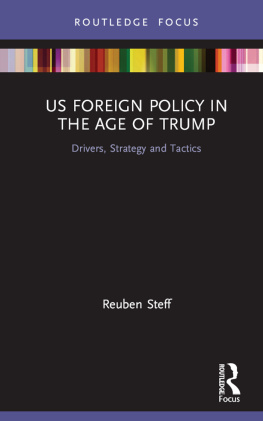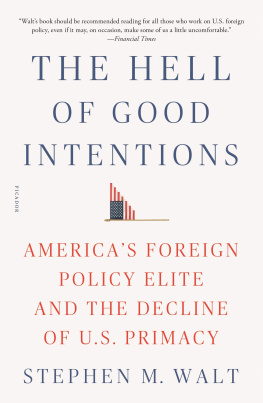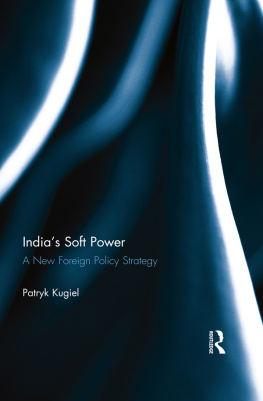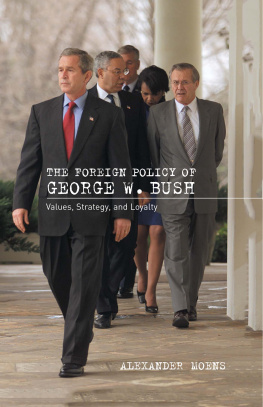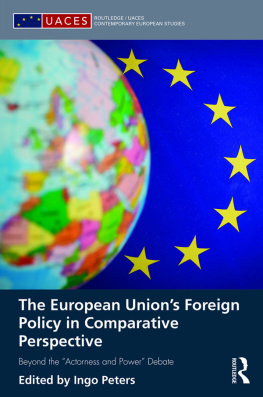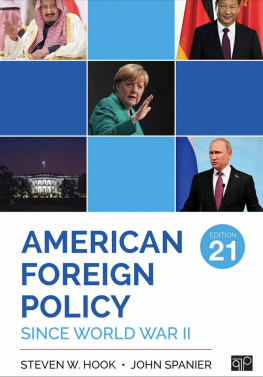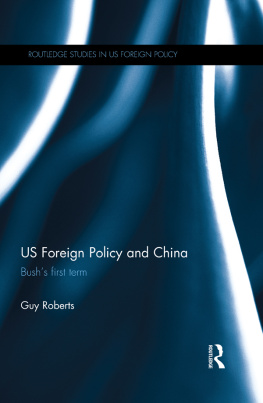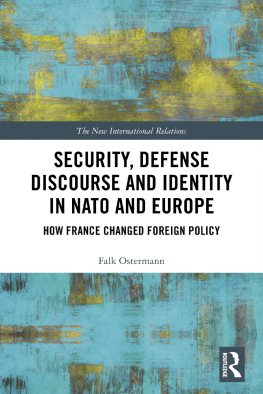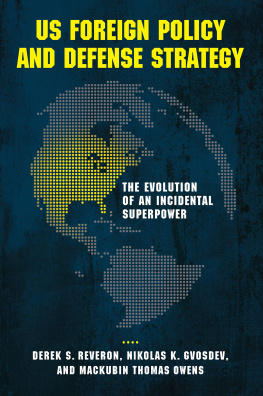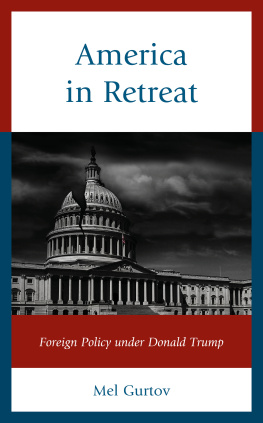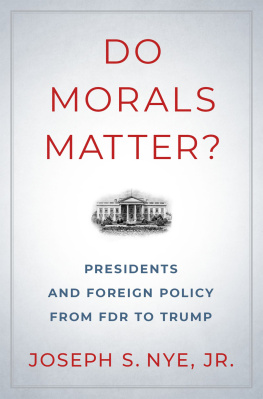US Foreign Policy in the Age of Trump
This book investigates the drivers, tactics, and strategy that propel the Trump administrations foreign policy.
The key objective of this book is to look beyond the noise of the Trump presidency in order to elucidate and make sense of contemporary US foreign policy. It examines the long-standing convictions of the president and the brutal worldview that he applies to US foreign policy; and his hard-line negotiation tactics and employment of unpredictability to keep Americas major foreign interlocutors off-guard, such as NATO members, China, Mexico, Canada, North Korea, and Iran each of which are considered here. In strategy terms, the book explains that the president is responding to a new multipolar structure of power by engaging a Kissingerian strategy that eschews liberal values and seeks to adjust great power relations in Washingtons favor. By drawing upon a range of evidence and case studies, this book makes a number of compelling and provocative points to offer a new vector for debate about the workings, successes and failures, and ultimately the long-term implications for the world, of the Trump presidency.
This book will be of much interest to students of US foreign policy, security studies, and IR in general.
Reuben Steff is Senior Lecturer at the University of Waikato, New Zealand.
First published 2021
by Routledge
2 Park Square, Milton Park, Abingdon, Oxon OX14 4RN
and by Routledge
52 Vanderbilt Avenue, New York, NY 10017
Routledge is an imprint of the Taylor & Francis Group, an informa business
2021 Reuben Steff
The right of Reuben Steff to be identified as author of this work has been asserted by him in accordance with sections 77 and 78 of the Copyright, Designs and Patents Act 1988.
All rights reserved. No part of this book may be reprinted or reproduced or utilised in any form or by any electronic, mechanical, or other means, now known or hereafter invented, including photocopying and recording, or in any information storage or retrieval system, without permission in writing from the publishers.
Trademark notice: Product or corporate names may be trademarks or registered trademarks, and are used only for identification and explanation without intent to infringe.
A catalogue record for this book is available from the British Library
Names: Steff, Reuben, author.
Title: US foreign policy in the age of Trump : drivers, strategy and tactics/Reuben Steff.
Description: New York : Routledge, 2021. | Includes bibliographical references and index.
Identifiers: LCCN 2020018228 (print) | LCCN 2020018229 (ebook) | ISBN 9780367860936 (hardback) | ISBN 9781003016861 (ebook)
Subjects: LCSH: United StatesForeign relations2017- | National securityUnited States. | Trump, Donald, 1946- | World politics21st century.
Classification: LCC JZ1480 .S78 2021 (print) | LCC JZ1480 (ebook) | DDC 327.73dc23
LC record available at https://lccn.loc.gov/2020018228
LC ebook record available at https://lccn.loc.gov/2020018229
ISBN: 978-0-367-86093-6 (hbk)
ISBN: 978-1-003-01686-1 (ebk)
by MPS Limited, Dehradun
Deciphering the Trump administrations foreign policy
Introduction
Donald Trumps presidency is unlike that of any previous US administration. Without exaggeration the Trump administration is both disruptive and iconoclastic. And given the tendency of the president to lie, dissimulate, distract, offend, and contradict himself through a torrent of verbiage, discerning the reasons for such unprecedented behavior is stretching the analytical capacity of scholars. This may very well be intentional, as this book will reveal. It shows that the president is committed to projecting an image of himself as an unpredictable actor, and senior administration officials assert that working to destabilize world affairs is now in the US national interest (Goldberg, 2018). In essence, together they appear to believe that injecting an element of unpredictability and a feeling of permanent destabilization into international affairs will redound in Americas favor, giving it leverage across a range of issues. As such, amidst the cacophony of the Trump presidency, is it possible to unearth the logic behind his foreign policy? Are the tactics and strategy a product of the presidents supposedly unique business acumen, driven by ideological conviction, the unique qualities of Trump the individual and the domestic political imperatives he faces, or are they due to international systemic challenges? Alternatively, perhaps it is a combination of all of these.
A review of the existing literature that interrogates the Trump administrations foreign policy drivers can be broken down into two basic frames. These are domestic factors (including the presidents personal worldview) and the international system/balance of power. Scholars that emphasize the latter have usually tended to connect their analysis to domestic considerations as well, suggesting a collapsing gap between the domestic and international levels. With that in mind, this book makes a novel contribution to the existing literature on contemporary US foreign policy in two ways. The first results from a synthesized and multi-level consideration of the drivers and underlying logic of the Trump administrations foreign policy tactics and strategy. Here, it draws upon the three levels of analysis (also known as frames) approach to international relations and international security issues proposed by Kenneth Waltz ( It also highlights the difficulty in clearly discerning whether the domestic level or international structure has greater sway in terms of influencing Trumps foreign policy.
The second novel contribution is through an articulation of the methods utilized by the presidency and an evaluation of whether they have been able to achieve his stated goals in the global arena, enhancing our understanding of the policy outcomes US diplomacy is attempting to achieve. In an environment that often takes its analysis on every individual foreign policy decision in isolation, it can be beneficial to survey the policy record of the administration across the fuller thematic and temporal scope of the government. Taking a broader view of the decisions the Trump administration has made in pursuit of its agenda clarifies the patterns and priorities which are evident in the decision-making structure of the administrations foreign policy apparatus. It also provides an insight into whether the president will continue to use his preferred methods and whether they could proliferate throughout the international system, with perceived successes breeding mimicry. The implications of this for interstate behavior would be immense.
Before proceeding, a caveat is in order. It is clear that any analysis of President Trump given his peculiarities and penchant to lie and deceive (perhaps even to practice self-deception) is likely to find itself challenged by the style and method through which Trump conducts his affairs. The scholar has to ask how much agency they should attribute to the president, how much of what he does and says is the result of a deliberate, calculating agenda, and how much is the product of an impulsive and chaotic mind. Yet, the historical record shows the president has a number of long-standing convictions and ideas about important international issues, and he is fiercely determined to pursue whatever end he sets himself. Having employed certain methods to (generally) be successful as a businessman prior to his presidency, and seemingly convinced of his own genius and the power of his agency to change global arrangements in his preferred direction, it was always likely that the patterns of behavior from his pre-presidential tenure would carry through into his time in office. As such this book takes Trump seriously, even if not literally all the time and in a point of departure from many analyses on the Trump presidency it imputes a greater level of tactical and strategic decision making on behalf of the president, even as it admits we may never truly know his mentation to the degree we think we understand those of other presidents. This account does not express support for the presidents policies or operating style. Rather, it seeks to outline and consider his personal characteristics in a more objective manner than is typical in contemporary scholarship, and the interrelationship between the president and domestic and international forces. In doing so the arguments and evidence presented throughout offer an interesting, new vector for debate in the international relations literature about the workings, successes and failures, and ultimately the long-term implications for the world, of the Trump presidency.

